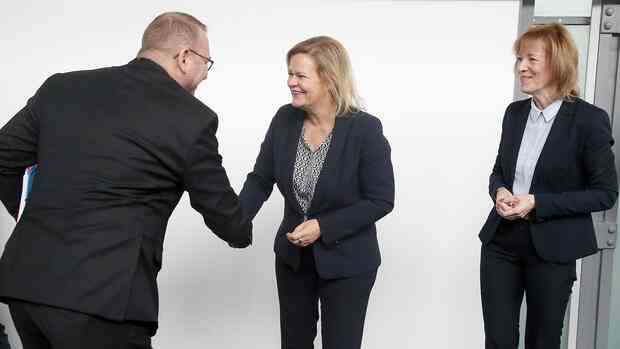The talks also deal with the “social component”.
(Photo: dpa)
Berlin When the collective bargaining partners in the public sector meet on Wednesday and Thursday for the second round of negotiations, the so-called “social component” will also be discussed. Verdi and the Civil Service Association are demanding 10.5 percent more money for the 2.5 million federal and local government employees – but at least 500 euros. The minimum amount means that lower salary groups are raised more in percentage terms than higher ones.
“Verdi and the civil service association are acting as advocates for the weak,” explains Hagen Lesch, collective bargaining expert at the employer-related Institute of German Economics (IW), the underlying strategy. “They not only want to keep the distance to the minimum wage, they also want to avoid poverty in old age in lower income groups.”
Thorsten Schulten from the Institute for Economic and Social Sciences (WSI) of the Hans Böckler Foundation, which is close to the trade union, points out that the lowest wage groups in the public sector are currently only paid the statutory minimum wage. “Of course, that is difficult to reconcile with the self-image of a civil servant.”
In times of exorbitantly high price increases, the “social component” should also serve to relieve low earners in a targeted manner. Because they have to spend a large part of their income on subsistence, they suffer particularly from inflation.
Minimum amounts therefore also play a role in other current or upcoming collective bargaining rounds, for example in the textile industry or on the railways. At the post office, Verdi set the record-high tariff of 15 percent, but waived a minimum amount. Because here almost 90 percent of the employees are distributed among the lowest three salary groups, so that the intended upgrading of rather low incomes also works with the percentage requirement.
With the 500-euro base in the public sector, however, it is difficult to still speak of a “social component”. Because the amount would not only bring disproportionate increases in income to employees with low wages and salaries, but would also have a major impact on the wage structure.
In the lowest salary groups, earnings rose by up to around 25 percent, according to the Association of Municipal Employers’ Associations (VKA). But even in the second-highest salary group E 14, the minimum amount of 500 euros still leads to a percentage increase in income of more than 10.5 percent. For example, doctors working in administration who currently earn just under 4543 euros a month at the lowest level of experience received eleven percent more money.
>> Read here: Fear of the wage-price spiral: Despite falling inflation rates, wage demands are rising
Christine Behle, deputy Verdi chairwoman responsible for the public service, explains the high “social component” by saying that inflation is a burden on employees far into the middle class. But the VKA doesn’t want to go along with that. According to them, the minimum amount alone would lead to additional costs of 14.7 billion euros in the municipalities – without the increase in training allowances. The 10.5 percent requirement only increased the costs slightly by around 400 million euros.
From the employer’s point of view, the high minimum amount is “the completely wrong signal at a time when the municipalities are desperately looking for managers and those responsible,” as a VKA spokeswoman said. IW collective bargaining expert Lesch takes a similar view: Already in the 2018 collective bargaining round, the unions ensured that the collective wages of young professionals and lower pay groups were increased disproportionately. “At some point you have to be satisfied with the tariff grid.”
Above all, the unions want to improve the situation for low-income workers, who are particularly hard hit by inflation.
(Photo: dpa)
Schulten, who heads the collective bargaining archive at the WSI, points out that the very differentiated conclusion in 2018 brought disproportionate growth to lower pay groups, but also to specialists who were particularly in demand, such as IT specialists or engineers. “But at the moment the issue of inflation is dominant.” In addition, there is not only a shortage of skilled workers, but a general shortage of workers, says Schulten. Therefore, there must also be improvements for lower pay groups.
IW expert Lesch suggests organizing the inflation adjustment for lower income groups via one-off payments, which the state makes tax and duty-free up to the amount of 3,000 euros. However, Verdi boss Frank Werneke has made it clear that the one-off payments devised in the “concerted campaign” are welcome, but cannot replace sustainable tariff increases.
Before the second round of negotiations, Verdi and the civil servants’ association increased the pressure on employers with warning strikes and, among other things, largely paralyzed large German airports all day. Werneke and the head of the Civil Service Association, Ulrich Silberbach, have already threatened to further escalate the conflict if Federal Interior Minister Nancy Faeser and the VKA do not move. A third and last round of negotiations is scheduled for March 27-29.
More: Civil Servants Association boss on the 15 percent collective bargaining demand: “The cost of living has risen dramatically”

